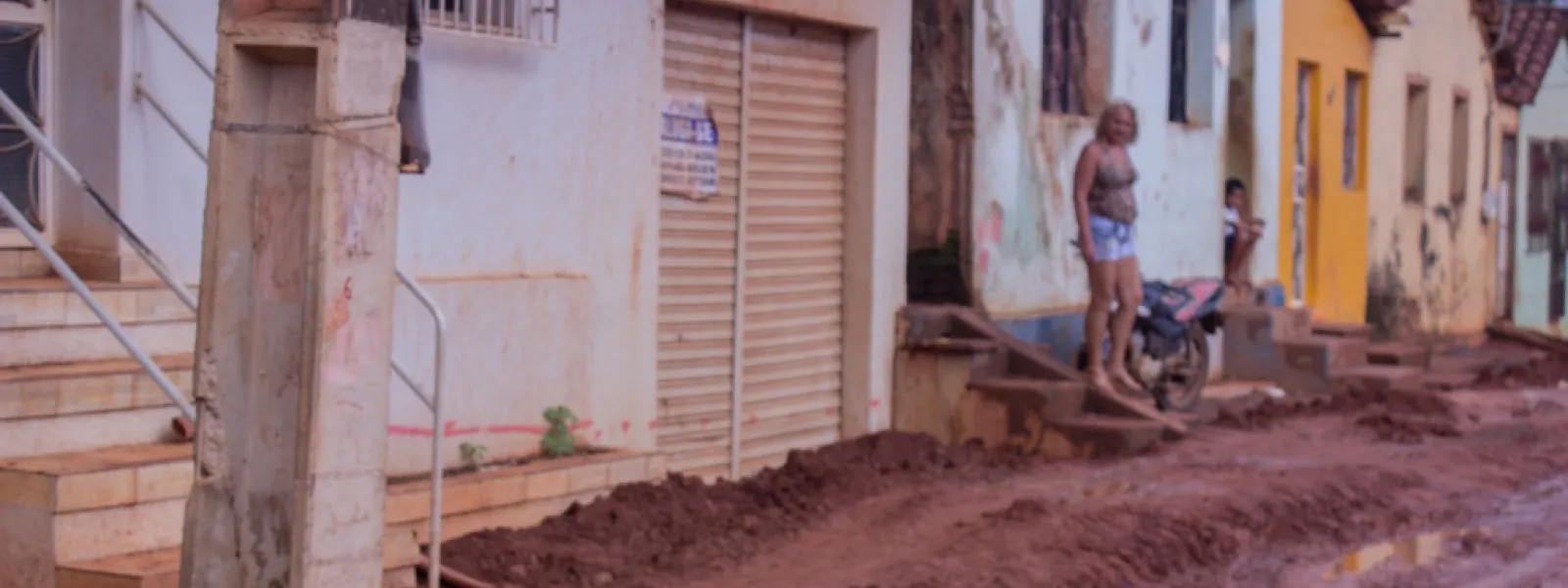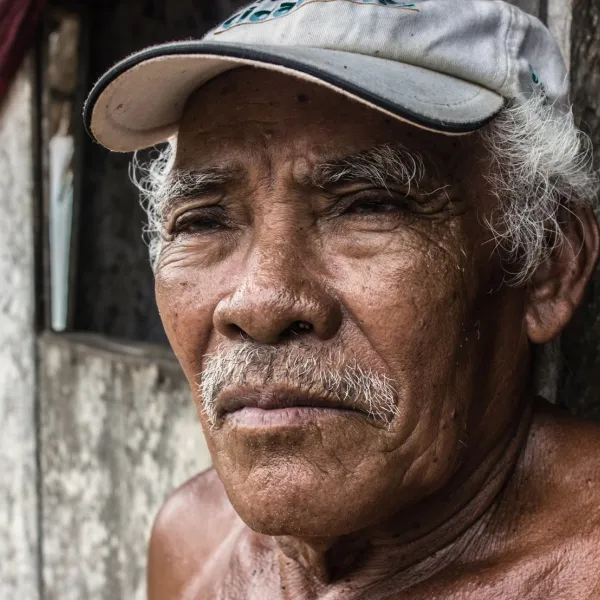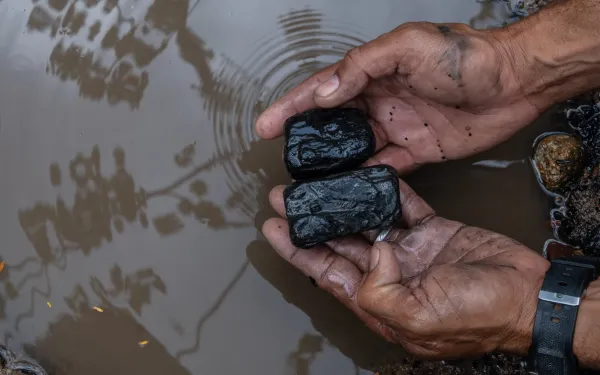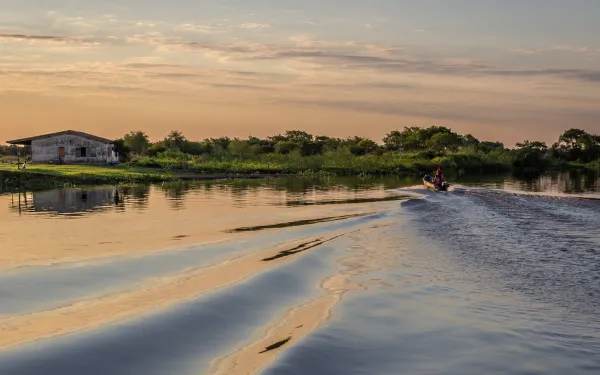
Project
Maíra Irigaray / Amazon WatchFazendo com que o Brasil se responsabilize pelos danos da represa Belo Monte
Quando em pleno funcionamento, Belo Monte será a terceira maior usina hidrelétrica do mundo, construída em um dos ecossistemas mais importantes do planeta: a floresta Amazônica. Localizada no rio Xingu, no Pará, um estado do norte do Brasil, o reservatório cobrirá mais de 500 quilômetros quadrados de florestas e terras agrícolas, uma área do tamanho da cidade de Chicago.
Para a população da Bacia do Xingu, a construção de Belo Monte tem significado a perda do acesso à água, à alimentação, à moradia, ao trabalho e ao transporte. Ao menos 20 mil pessoas serão deslocadas.
O governo e o consórcio encarregado do projeto começaram a construir a usina sem antes consultar primeiro as pessoas da região, muitas das quais são indígenas. Negligenciaram a normativa internacional de direitos humanos, a qual requer o consentimento prévio, livre e informado das comunidade indígenas afetadas. O Brasil também descumpriu as medidas cautelares outorgadas pela Comissão Interamericana de Direitos Humanos, as quais destinavam-se a proteger a vida, saúde e integridade das comunidades.
A represa começou a operar, ainda que não em plena capacidade. Recentemente um tribunal federal suspendeu a Licença de Operação do empreendimento devido à falta de cumprimento, por parte do consórcio, com as obras de saneamento básico em Altamira, cidade diretamente afetada pela hidroelétrica.
Consulta o expediente de fatos do caso
Partners:

Related projects

Colombia: Communities and workers win first court ruling on coal mine closure that protects their rights
The Interamerican Association for Environmental Defense (AIDA) celebrates the ruling of the Constitutional Court of Colombia, which recognizes the rights to due process and participation of communities and workers in the closure of coal mining projects in the department of Cesar. This ruling comes after years of insistence by these groups, who filed a tutela lawsuit. In this case, AIDA contributed with a legal brief that includes the analysis it has conducted on the issue of closure and responsible exit in Latin America, from the perspective of the right to a healthy environment and other human rights.Below, we share the statement of the communities and workers on the occasion of the ruling.The Constitutional Court of Colombia issued the first ruling on mine closures in the country (T-029 of 2025). It guaranteed due process and, consequently, the effective participation of the communities and unions representing more than 20,000 people in the more than four municipalities affected by the environmental, social and economic impacts of the first irregular abandonment and closure of large-scale coal mines in Colombia.We, a group of affected communities and dismissed workers from Cesar and Magdalena, have led a legal action for more than four years to ensure a public dialogue through a large consultation table where the communities, dismissed workers, local authorities and the affected citizens in general of the mining municipalities of La Jagua, El Paso, Becerril and Ciénaga can know and participate in the definition of compensation and restoration measures that the multinational Glencore - Prodeco must carry out in these municipalities as part of its mining abandonment and closure plan, which is in the process of being approved by the National Environmental Licensing Authority (ANLA).In this ruling, the court determined that the Seventh Administrative Court of Valledupar violated the fundamental right to due process by considering that the multinational company had complied with this participation process with a SINGLE socialization meeting held in November 2022 in these municipalities, which is clearly insufficient and does not comply with what was agreed in the minutes of the meeting, where the commitment of the parties was to convene the GREAT TABLE OF DIALOGUE AND CONCERTATION in the presence of the affected population of these four municipalities.The court ordered to initiate again the opening of the contempt proceeding against the legal representative of Grupo Empresarial PRODECO S.A. and to review the compliance with the judgment and the agreement contained in these minutes.We, as communities and unions of the mining corridor, supported by national and international civil society organizations, and represented in court by attorney Rocío Torres Bobadilla, consider that this public roundtable may be the last opportunity for us to make a balance of what has happened in our territories after 25 years of exploitation and achieve measures for Glencore to compensate and restore all the impacts caused.Therefore:We invite Glencore - Prodeco to a constructive dialogue, to avoid evasive maneuvers and to respect the importance of this judicial decision.We request the Colombian State, headed by the ANLA, the DEFENSORIA and the PROCURADURÍA to accompany us in this process, support this judicial decision and strengthen our protection measures to guarantee our safety as leaders in this process to comply with this ruling.We request national and international organizations to continue supporting us to guarantee a real and effective participation and that this GREAT CONCERTATION TABLE is fulfilled. Finally, we ask the entire population of the country and especially of the municipalities of La Jagua, Becerril, El Paso and Ciénaga to accompany us, support us and join us in a great process to DEFEND THIS JUDICIAL DECISION which is HISTORIC for our territory in order to restore and compensate the serious environmental and social impacts caused by the irregular mining closure and to find measures to address the great poverty and unemployment we are experiencing.Join us to be heard, to heal our territories and to recover our economy.Signed byJunta de acción comunal de BoquerónConsejo Comunitario Afrodescendiente Coafrovis de la Victoria de San IsidroRed de Mujeres del Municipio del Paso Asamblea Campesina del Cesar por la Restitución y el Buen Vivir Asociación de Usuarios Campesinos (ANUC) el Paso Sindicato Nacional de Trabajadores del Carbón (Sintracarbón) Sindicato Nacional de los Trabajadores de la Industria Minero-Energética (Sintraminergetica) Sindicato Nacional de los Trabajadores Mineros Asociación del Reguardo Sokorhpa del Pueblo Indígena Yukpa Consejo Comunitario Caño Candela de Becerril Junta de Acción Comunal del Barrio Don Jaca en Santa Marta Corregimiento de Cordobita en Ciénaga (Madgalena) Vereda el Hatillo Representante Junta de Acción Comunal Sororia de la Jagua de Ibirico Centro de Estudios para la Justicia Social Tierra Digna Rocío Torres Bobadilla- environmental rights defender National and international organizations and defenders that SUPPORT US:Universidad del Magdalena Universidad del Magdalena Clínica Jurídica Interamerican Association for Environmental Defense (AIDA)London Mining Network PAX Holanda PAX Colombia CNV InternationaalSolifonds Multiwatch ASK Switzerland-Colombia Working GroupUrgewald Polen –Transiciones JustasAna Catalina Herrara - labor rights defenderÁngela Velandia Cruz – human rights defender
Read more
Life in Andean wetlands at risk from extractivism
The expansion of industrial extraction of lithium and other minerals for the energy transition of the global north threatens wetlands in Argentina, Bolivia and Chile. These delicate ecosystems are an abundant source of life and fundamental for human subsistence, environmental balance and for mitigating and adapting to the climate crisis.The Andean wetlands - including salt flats, lakes and lagoons - of Argentina, Bolivia and Chile are at serious risk due to the advance of the extraction of lithium and other minerals demanded for the energy transition in the countries of the global north. The Andean Wetlands Alliance warns of this threat to these ecosystems where life abounds and which are key to human subsistence and biodiversity in general and to the fight against the climate crisis.This year, the Convention on Wetlands proposes as the theme for World Wetlands Day: “Protecting wetlands for our common future”. This theme highlights the importance of collective action to protect these ecosystems, on which the future of humanity depends.According to United Nations data, although they cover only 6% of the earth's surface, wetlands are home to 40% of all plant and animal species. And, worldwide, more than 1 billion people (one eighth of the Earth's population) live in rural and urban areas that depend on these ecosystems for their livelihoods. However, with a 35% global loss in the last 50 years (since 1970), wetlands are the most threatened ecosystem, disappearing three times faster than forests.In Latin America, the Andean wetlands of the Gran Atacama region - located in the border area of Argentina, Bolivia and Chile - are home to unique species of flora and fauna, especially adapted to extreme climatic conditions, as well as microorganisms that absorb carbon dioxide and release oxygen. Its high capacity to purify and store water guarantees the supply of the resource for communities and species, also generating conditions for adaptation to the climate crisis.However, due to the presence of large quantities of lithium in these wetlands - the three countries concentrate more than 53% of the resources (potentially exploitable material) of the mineral - there is great pressure on them: corporate and state actors have developed a growing and massive mining industry to meet the demand for lithium in the global north, oriented to the manufacture of electric vehicles and energy storage from renewable sources, among other purposes.On the other hand, national and provincial governments see the industry as an opportunity to attract investment and strengthen their economies, for which they relax or poorly implement regulations that require an adequate analysis of the environmental and social impacts of projects. Likewise, there are no processes of consultation and free, prior and informed consent with the indigenous communities living in the territories. Nor are the rights of access to information, citizen participation, access to justice in environmental matters, or a safe environment for environmental defenders guaranteed.One of the main impacts of this type of mining (lithium extraction) is on water, a central element of Andean wetlands. Lithium is extracted from the water beneath the salt flats, a process that requires both saltwater and freshwater. Andean wetlands exist in regions where survival depends on the scarce water that defines them. The expansion of extractivism in the Gran Atacama regionArgentinaAccording to official data, the country has a portfolio of more than 50 lithium projects in different stages of progress, mainly located in the provinces of Salta, Catamarca and Jujuy. Three of them are in production and export stage (a fourth project started production in July 2024), four are under construction and more than 40 are at different stages of progress (prospecting/exploration/feasibility), mostly in advanced exploration phase. In Salta and Jujuy operate large companies such as Pan American Energy, Pluspetrol and Tecpetrol, historically linked to the oil and gas industry, which are now expanding their presence in renewable energy sectors, with a marked interest in lithium extraction.However, through an amparo action filed against the authorities and government of the province of Jujuy, it has come to light that there are more than 40 mining projects in the Salinas Grandes Basin and Guayatayoc Lagoon alone, an endorheic basin where more than thirty native communities belonging to the Kolla and Atacama peoples/nations live. To date, their progress and whether there are other projects is unknown because access to public environmental information is restricted and is not provided in a complete and timely manner, in breach of national regulations and international standards. In the Salar del Hombre Muerto, Catamarca, is the oldest lithium mining enclave in the country. The salt flat has been exploited since 1996 by the company Livent (now Arcadium Lithium), causing the total and irreversible drying up of the vega of the Trapiche River. In March 2024, the Supreme Court of Catamarca ordered a halt to mining activity in this salar until a cumulative environmental impact assessment is conducted. BoliviaIn the Salar de Uyuni, the largest in the world, resources of 23 million tons of lithium have been identified. And there are 26 other salt flats that, by regulation, are reserved for the exploitation of the mineral; exploration activities are being carried out in six of them. In Bolivia, lithium is state-owned. The country has a state-owned exploitation plant that began operating in 2024 at 20% of its capacity. In 2012 and 2018, two public consultations were held for state-owned plants, but these excluded indigenous and native communities with titled collective lands. Some communities have informally denounced a significant depletion of springs and water wells. The degradation of the Salar de Chalviri and the overexploitation of lithium and boron in the Salar de Capina have also been denounced.Since 2023, agreements have been signed and exploration and camp installation activities have begun with one Russian and two Chinese companies. These agreements have resulted in two contracts, signed at the end of 2024 and pending approval by the Legislative Assembly, with the Russian company Uranium One Group for a plant in the Salar de Uyuni and with the Chinese consortium CBC Hong Kong (CATL-BRUMP-CMOC companies) for two other plants in the same salar. Also at the end of last year, a second international call was launched for the exploitation of four other salt flats (Empexa, Capina, Cañapa and Chiguana), which has resulted in the signing of agreements with the companies EAU Lithium Pty Ltd (Australia), Tecpetrol S.A. (Argentina) and Geolith Actaris (France). These agreements, contracts and processes have been developed without prior consultation processes and with a lack of transparency. ChileThe Salar de Atacama basin is home to more than 90% of Chile's lithium reserves and was one of the first to be exploited by the mining industry. Currently, there are four major mining operations in the Salar Atacama, located in the Antofagasta Region: lithium extraction by Sociedad Química y Minera de Chile (SQM) and Albemaerle, under contracts with the Corporación de Fomento de la Producción (CORFO), which involves the extraction of more than 2,000 liters of water per second; and the parallel extraction of copper by Minera Escondida and Minera Zaldívar, which extract more than 1,400 liters of fresh water per second, aggravating the already critical water crisis in the area. The Atacameño Community of Peine, who live in the salar basin, has taken legal action denouncing the overexploitation of their aquifers, while in Calama, citizen movements are demanding water governance in the face of uncontrolled extraction by mining companies. In 2015, a government-appointed committee recognized that brine extraction has adverse effects on the ecosystem, but instead of regulating its use, it confirmed the government's long-standing policy of regulating lithium production.In Chile, the government has exclusive property rights over lithium under Decree Law 2886 (1979). This means that state institutions, particularly CORFO, set the conditions under which private companies operate in the salars. In 1979, following U.S. directives, the Chilean government - the dictatorship of Augusto Pinochet - declared lithium a “strategic mineral” and took measures to safeguard long-term reserves by limiting production through quotas accredited by the Chilean Nuclear Energy Commission.The National Lithium Strategy, launched in 2023, seeks to expand state exploitation, including new projects in the Maricunga and Pedernales salt flats. Chile concentrates 36% of global lithium production and, with at least 31 new green hydrogen projects in the pipeline, pressure on water resources will increase exponentially. It is known that, since 2013, on SQM's property, 32.4% of the carob trees (Prosopis chilenis) have dried up due to lack of water. The carob tree is a native tree, resistant to drought and with very deep roots that allow it to survive in this environment. Press contacts Víctor Quintanilla, Interamerican Association for Environmental Defense (AIDA), [email protected], +52 5570522107Rocío Wischñevsky, Fundación Ambiente y Recursos Naturales (FARN), Argentina, [email protected], +54 1159518538Verónica Gostissa, Asamblea Pucará (Argentina), [email protected], +54 93834771717Juan Donoso, Formando Rutas (Chile), [email protected], +4915780743628
Read more
Biocultural Corridor: Hope for a better future for the Pantanal
By Jorge Lu Palencia and Andrea Islas López*The Pantanal is a unique and rich wetland. It integrates elements of the semi-arid Amazon Rainforest, the Atlantic Forest (humid forest), the Cerrado (tropical savannah), the Chiquitano Dry Forest and the steppe savannah of the Chaco. With an extension of almost 18 million hectares, it crosses the borders of Bolivia, Brazil and Paraguay. Its biodiversity is fundamental to water conservation, food production, climate regulation, and the life and culture of millions of people: farmers, traditional communities, quilombola communities, and indigenous peoples. The Pantanal, however, is in danger of disappearing due to devastating seasons of forest fires and other threats caused by structural deficiencies in the institutional management of the ecosystem.In 2022, civil society organizations asked the Ramsar Convention to apply the protection mechanisms for wetlands of international importance to the Pantanal, warning that the number of heat sources had increased to five times the historical average. And in 2024, they reported that the fire season again exceeded historical average conditions.A few weeks after the fires, in November 2024, the Popular Water and Climate Committees—made up of small farmers from the Paraguay River basin—gathered to celebrate nature and reaffirm their commitment to water conservation through the self-affirmation of the Paraguay River / Pantanal Biocultural Corridor.These committees have been working for more than 25 years to confront the socio-environmental threats posed by mining, projects such as waterways and hydroelectric dams, and soy and sugarcane monocultures.They represent an alternative model of ecosystem management in which communities organize themselves to protect their territory and promote sustainable practices. What does self-affirmation of the biocultural corridor mean?In environmental practice, the term “corridor” is applied to ecological corridors, whose main function is connectivity, i.e., the movement of wildlife species for shelter, feeding and reproduction, as well as plant dispersal.Adding the “biocultural” element to the corridors means thinking that human beings are part of the ecosystem, that the conservation of nature does not exclude the purpose of making possible the full life of human groups, and that culture—materialized in the diverse world views, ancestral knowledge, traditional practices and forms of organization—is a fundamental element for effective conservation of nature.The self-affirmation of the popular committees of the Pantanal is a milestone that reminds us that the protection of nature does not depend only on the action of governments but is made possible by the awareness and popular initiative of communities and peoples. It shows that the exercise of public participation rights is indispensable and fundamental for public policies that make life and socio-environmental justice possible.Biocultural corridors make it possible to integrate conservation and economic and cultural activities with ecological practices, thus promoting a more sustainable future for the communities and the Pantanal region.They represent the birth of a more legitimate and effective conservation initiative, a participatory management and an organizational system in which decisions and policies flourish from the bottom up. An alternative model to poor institutional governance In the context of the climate crisis and a political and economic system that exacerbates the threats, the devastating fire seasons in the Pantanal highlight the problems of land-use change, irresponsible use of fire for agricultural and cattle raising activities, inadequate management of resources to prevent and fight fires, and the lack of coordination and transboundary cooperation.Structural deficiencies in institutional governance have led to inadequate public policies or even to habitat loss through incentives for monocultures and extensive cattle ranching, water regulation using waterways and dams that provide ecosystem services, subsistence and culture for local communities and indigenous peoples.Faced with this panorama, the self-affirmation of the biocultural corridor emerges as an alternative model of territorial management, driven by the people as a response to the lack of effective public policies.With this model, the communities promote conscious popular education to protect water and adopt ecological agricultural practices, instead of relying on a system that favors an economy of degradation at the expense of habitat destruction. Reasons to be hopeful about preserving the PantanalThe self-affirmation of the biocultural corridor allows us to be optimistic due to:The resilience of the people of the Pantanal, which allows them to overcome the devastation and open an alternative path for the conservation of the ecosystem, with the initiative and participation of the farmers.Emancipatory awareness and action that puts life at the center, based on the rights of nature, respect for human rights, and social and environmental justice.An organization that resists and builds itself democratically, based on the Pantanal’s identity, mystique, ancestral knowledge and sustainable traditional practices.A popular and participatory management model that harmonizes conservation and integral development goals, builds bridges with other communities and indigenous peoples, and has the potential to expand as a transboundary socio-environmental governance system with an ecosystem approach.Thanks to the popular committees, the Pantanal is alive and has possibilities for a more sustainable future. The creation of the biocultural corridor is a clear sign of hope for this vast and rich wetland.This model, based on popular management and respect for nature, offers a viable alternative to the threats facing the Pantanal and is a source of inspiration for other territories in crisis on the continent.* Jorge Lu Palencia is an attorney with AIDA's Ecosystems Program; Andrea Islas López is an attorney and intern at AIDA.
Read more